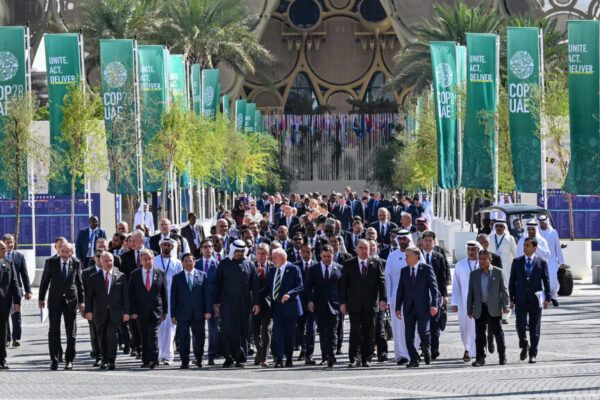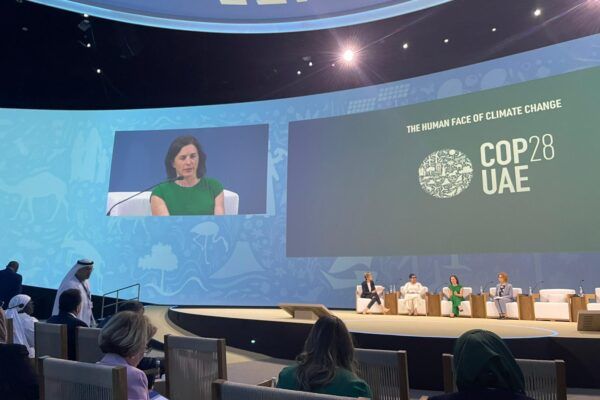This year’s UN Climate Change Conference (COP28) achieved a long overdue step forward by culminating in the first commitments to transition away from fossil fuels in three decades of climate negotiations. But, as outlined in our response to the outcomes, we need to see a fair, fast and full phase out of fossil fuels to address the global climate and health crisis.
Beyond these outcomes, COP28 was an opportunity for clean air advocates to make the case for tackling air pollution. A group of Clean Air Fund’s staff attended a range of sessions and side events to highlight the transformative potential of clean air for climate and health. Here, they each give their top takeaways from COP28.
1. Health is now central in climate negotiations, but will be undermined without full fossil fuel phaseout
Jane Burston, CEO:
COP28 isn’t just about negotiating carbon emissions. It’s about negotiating fewer children suffering asthma attacks, preventing lung cancer cases and strokes, and creating a better quality of life for all of us. I was honoured to address the first ever COP Health Day to call for action on air pollution and climate change together to improve public health.
The landmark Climate and Health political declaration endorsed by 142 governments (and counting) has embedded health into climate negotiations from now on. While the health benefits of cleaner air are noted, the declaration fails to mention fossil fuels as the primary driver of climate change, health damage and air pollution. To reduce the 5 million premature deaths caused by fossil fuel air pollution every year, governments need to commit to a fast, fair and full phase out of fossil fuels.
2. We need more investment in integrated solutions
Nina Renshaw, Head of Health:
Major health institutions and philanthropic organisations endorsed new Climate and Health Financing Principles and pledged $1 billion for health investments in climate action. This focus on climate and health financing is long overdue. While governments and the global health community mobilised unprecedented resources to turn the tide on COVID-19, air pollution still struggles to attract even 1% of international development funding. Whilst the billion dollar commitment sounds impressive, the vast majority is not actually new funding and was already committed to health projects ahead of COP28. Observers need to watch out to ensure these programmes mobilise additional funding and include climate substance as well as branding.
To make matters worse, investments in clean air are overshadowed many times over by trillions of dollars spent every year in fossil fuel subsidies – literally adding fuel to the fire of climate change and ill health. The final COP28 texts recognises the need to phase out “inefficient fossil fuel subsidies”, although all fossil fuel subsidies should be seen as inefficient once their costs to health and the environment are accounted for. To effectively catalyse further investment, funders need to finance more clean air solutions, both a means to step back from the brink of climate breakdown and a way to rapidly and tangibly improve people’s health and daily lives.
3. Cities are primed for accelerating climate progress
Jane Burston:
Cities only occupy 3% of the earth, but they are home to 50% of the world’s population. Cities are on the frontline of both the impact of and solutions to air pollution. Urban action on clean air can have a huge positive impact on public health, economic growth, social justice and equity. Our Pollution to Solution report showed that in just six African cities, clean air measures could prevent 109,000 premature deaths by 2040.
Initiatives like Breathe Cities are supporting cities to cut their air pollution and carbon emissions at the same time. Now more than ever, city governments need to utilise policy levers that deliver the biggest impact for their residents. At COP 28, we announced a cohort of nine cities that will be working on that impact as part of Breathe Cities.
4. The private sector needs to play its part
Sean Maguire, Director of Strategic Partnerships:
Health Day was a chance for the global community to break down silos on the climate and health nexus and begin vital cross-sectoral work. The private sector needs to be part of addressing the global air pollution crisis. Air pollution hampers workforce productivity, causes staff absences and damages overall economic activity.
Clean air is good for business, people and planet. We need to see more global and private sector mobilisation for businesses advocating for clean air. The Alliance for Clean Air is the first global private sector initiative supporting trailblazing multinational corporates to reduce their air pollution emissions. While these businesses have taken a pivotal first step, more businesses across all sectors need to play a role in growing the momentum on clean air.
5. Keep finding new ways to make the case for air pollution
Jenaina Irani, Analyst:
Michael Pinsky’s Pollution Pods drew a lot of attention in the Blue Zone at COP28. When you enter the immersive exhibit, you really feel the levels of air pollution and how they change from London to Delhi to Beijing. After feeling, tasting and smelling each cities’ air, participants were struck by both the unhealthy levels and stark disparities in air quality (including The Independent’s Stuti Mishra, a resident of New Delhi).
Air pollution is a trans-boundary issue that affects us all, but many low- and middle-income countries have the highest levels of pollution in the world. This complex issue intersects with climate, health and social equity, but does not get the attention needed to address this global crisis. We need to find more compelling tactics and narratives to raise awareness of the problem. We need to keep explaining and highlighting the numerous benefits of clean air to inspire political and public action.
6. A global crisis requires global collective action
Jane Burston:
A global emergency requires a global response that is coordinated, well-resourced and built on proven solutions. It’s hard to understand why cleaning up the air we share is still not getting the funding, attention and backing it deserves. Not only is air pollution a problem which can be solved, but improving air quality also delivers knock-on benefits for global health and economic development.
Our Common Air is a new commission bringing together leading thinkers to explore how best to fill the gaps in funding, evidence and accountability and advance progress on air pollution.
7. National climate plans are missing a trick
Nina Renshaw:
The benefits of clean air are immediate and local, yet too many countries are still failing to reap the health benefits of clean air and climate action. Most governments’ climate strategies fail to embrace the transformative potential of reducing air pollution. These plans – called nationally determined contributions (NDCs) – need to integrate the health benefits of air quality improvements.
For example, black carbon emissions fuel climate change, but this pollutant is still largely untracked and uncapped by governments’ national climate plans. Clean Air Fund supported Global Climate and Health Alliance’s analysis of NDCs for air quality commitments and presented the results ahead of COP28 in a Scorecard, topped by Colombia. Lower- and middle-income countries’ NDCs are leading the way on clean air, but G20 countries are missing a vital opportunity.


